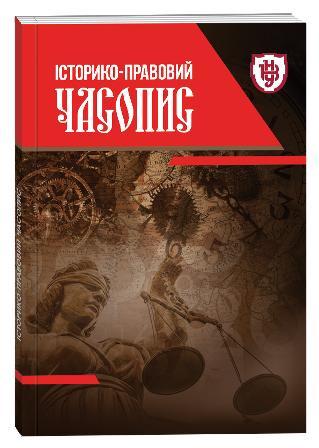EVOLUTION OF THE LEGAL STATUS OF PEASANTS IN THE HETMANATE
DOI:
https://doi.org/10.32782/2409-4544/2021-2/1Keywords:
peasantry, legal status, Hetmanate, peasant duties, peasant social statusAbstract
The article establishes the directions and main stages of the peasantry legal status evolution in Hetmanate. It is shown that the Ukrainian peasantry of the second half of the XVII – early XVIII centuries was a heterogeneous state in legal, social and economic aspects. The categories of peasants that existed during this period are determined, the legal status of each of the categories is described. The general features of the processes of deepening property, social, legal differentiation within each of the categories of the Ukrainian peasantry, which lasted during the XVIII century, are established. The preconditions, reasons and peculiarities of the course of these processes within each of the categories of the peasantry of the Hetmanate are determined. The role of Russian influences, in particular, serfdom, on the processes of evolution of the peasantry legal status in Hetmanate is pointed out. Based on the analysis of hetman's articles and other normative acts, the nature and directions of political, legal, social and economic policy of Ukrainian hetmans in the sphere of regulating the legal status of the peasantry are generalized. The Russian imperial legislation of the second half of the XVIII century, which regulated the spread of serfdom in the Ukrainian lands, is described. The role of foreign policy factors and their influence on the evolution of the legal status of the peasantry of the Hetmanate is shown. It is proved that the common feature of the evolution of legal status for all categories of Ukrainian peasants in the second half of the XVII–XVIII centuries was the loss of personal freedom and increasing of legal dependence on large landowners – representatives of the regimental- hundredth administration. It is determined that this process was associated with the growth of obsolete, feudal land ownership. It is shown that the gradual attack on the rights of peasants in the late XVIII century was ended with the final introduction of serfdom in Ukrainian lands. At the same time, it was emphasized that the Ukrainian peasantry was not a passive object of social and economic oppression and appropriate legal measures: the second half of the XVII – beginning of the XVIII century were marked by numerous protests and examples of resistance, including armed, against the pressure from both the Russian and Ukrainian administrations.
References
Дорошенко Д. Нарис історії України. Т. ІІ. Вид. 2-е. Київ – Мюнхен : Глобус, 1992. 349 с.
Музиченко П. Історія держави і права України : навчальний посібник. Київ : Знання, 1999. 661 с.
Полонська-Василенко Н. Історія України. Т. 2 : Від середини XVII ст. до 1923 року. Київ : Либідь, 1992. 606 [2] с.
Рубаник В. Інститут права власності в Україні: проблеми зародження, становлення й розвитку в період до 1917 року. Харків : Легас, 2002. 352 с.
Історія Української РСР: У 8 т., 10 кн. Т. 3: Україна в період розкладу і кризи феодально-кріпосницької системи. АН УРСР. Ін-т історії. Голов. редкол. : Ю.Ю. Кондуфор (голов. ред.) та ін. Київ : Наук. думка, 1978. 608 с.
Ковальова С. Пом’якшуючі вину обставини в кримінальному праві Гетьманщини: юридичний, релігійний і моральний аспект. Держава і право. Вип. 31. Київ : Ін-т держави і права ім. В. Корецького, 2006. С. 57–62.
Оглоблин О. Люди старої України. Мюнхен : Дніпрова хвиля, 1959. 328 с.
Гуржій О. Українська козацька держава в другій половині XVII–XVIII ст.: кордони, населення, право. Ред. А. Романенко. Київ : Основи, 1996. 224 с.
Гуржій О. Заїмка землі й вільні військові села та містечка в загальному розвитку аграрних відносин на Лівобережній Україні. Історія та історіографія України. Зб. наук. праць. Київ : Наукова думка, 1985. С. 58–66.
Оглоблин О. Гетьман Іван Мазепа та його доба. Друге доповнене видання. URL: http://litopys.org.ua/coss3/ohl09.htm







